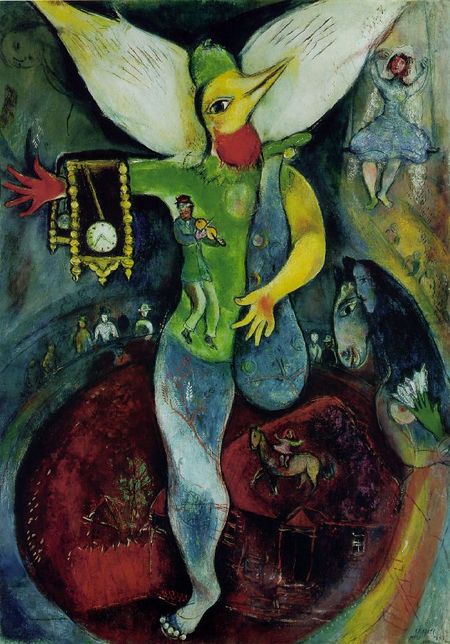November 29, 2005
Left hyperstition 2: Be Unrealistic, Change What's Possible
I promised another post on fictions, but first, and by means of introduction, a few more remarks on populism, prompted by Bat at Lenin's Tomb, Jon at Posthegemonic Musings, Le Colonel Chabert and Kenneth Rufo at Ghost in the Wire.
Bat claims that Zizek's anti-populist polemic ends up re-affirming the very liberal position that it began by querying: namely, the equation of populism with proto-fascism. By contrast, Bat argues that 'populism is not proto-fascist, it is proto-communist, and furthermore, the bourgeoisie knows this all too well, and that is why they seek to warn us against populism with their moralistic nostrums and cautionary tales. ... So: as crazy as it may sound, we have to side unflinchingly with populist movements and affirm their communist potential in the face of all this desperate mud-flinging by bien pensant neo-liberal ideologues.'
My first objection to this is that it cannot be seriously claimed that ALL populism is proto-communist. I'm not being facetious when I say I can't see the communist potential in the last Tory election campaign ('Are you thinking what I'm thinking?'), the Countryside Alliance or in tabloid newspapers' calls for the return of the death penalty, and yet it would be an eccentric definition of populism which excluded them.
Secondly, I would suggest that Zizek's formalism is not to be derided but commended. Communist potentials are only realised once a movement has ceased to be populist, since populism is that which, by definition, is always satisfied with making demands of the Master. That is because populism isn't proto-fascistic; rather - and this, surely, is the implicit element in Zizek's argument that needs to be drawn out in order to make it work - it always takes the form of a hystericized Liberalism.
Le Colonel Chabert's defence of populism (or attack on anti-populism) seems to confirm this, since it appears to takes the form, precisely, of an insistence that an evil oligarchy are responsible for capitalism. Zizek's (and my - here I couldn't agree more with Z) systemic account of capitalism is condemned as an exculpation of Capital's supposed Masters. 'The innocence and helplessness of the masters of capital needs constant confirmation ... Liberalism's most essential doctrine, restated, again and again, dressed up as unsentimental savvy.' Here we couldn't be more at odds: I would argue that 'liberalism's essential doctrine' is the one that LCC is defending; namely, the idea that someone is 'in charge' of capitalism, with the implication that 'if only' they resigned/ shot themselves/ reformed then everything would be OK. There are at least two problems with this.
Firstly, it strikes me as a desperately unconvincing picture of capitalism. (Needless to say it's an anti-Marxist picture too... Isn't the emphasis on the systemic character of capitalism what separates Marx's analysis from moralizing socialism?) The idea that the misleadingly-named 'ruling class' do anything more than manage and adminster Capital is an idle fantasy. Capitalists can decide on which groups are exploited, but they cannot legislate away exploitation itself. (How long would a CEO with such ambitions last?) It is not exculpatory but simply realistic to acknowledge that Capital, not capitalists, runs the show. However, realism about capitalism is not the same as Capitalist Realism. Neo-liberalism is defined not by the idea that Capital is a remorseless machine but by the claim that there is no viable alternative to its rule.
Secondly, this model attributes too little agency to the proletariat. As I argued here, if anti-capitalism restricts itself to addressing demands to Them, it colludes with the idea that only Their agency counts. I think we should worry less about exculpating Capitalists than about exculpating ourselves: if They are responsible for capitalism, we aren't. This may look like an inconsistency but it points to an assymetry. Capitalist 'agency' is only effective within the logic of Capital, which is why expecting capitalists to produce an alternative to capitalism isn't only empirically absurd, it's an analytic impossibility; proletarian agency, meanwhile, only comes into play Outside capitalism.
Defences of populism typically trade on an equivocation between populism and the popular. But as I argued in the last post, an unpopular populism is not only conceivable, it is the form which Capitalist post-politics takes in both Britain and the US at the moment. Conversely, and this is crucial, popular movements are not necessarily populist. Populism is, rather, the entrapment of popular movements within an already-existing representation. The masses are invited to rally under an ready-made image of themselves arising from lowest-common-denominator thinking. So my problem with populism is not, as Kenneth Rufo suggests, that it is not 'popusist enough' but that it has too little faith in the ways in which popular movements can exceed the circumscribed horizons of the populist.
It is not the demand itself which is characteristic of populism. It is stopping with the demand (and/or its satisfaction). All of which is why I don't have any problems with Bat's rather elegant overturning of situationist wisdom in the following passage:
'Here I'd suggest that the answer lies in the direct converse to the famous (and eminently hysterical) situationist graffito "Be realistic, demand the impossible!". Rather than formulate realistic but impossible demands, our "demands" must be unrealistic but nevertheless possible. And moreover they should be addressed diagonally, ie to both the ruling elite and the popular movement simultaneously, or more precisely, they should formally pose a demand addressed to the elite, but actually raise a slogan that engages and resonates with the movement – mobilising it and thereby subjectivating it from within.'
This, however, strikes me as an exceeding of the populist, in which the form of the demand is used to produce new populations.
What, then, of fictions? What did Badiou mean by his closing claim last week that 'when the world is dull and confusing, we have to sustain our belief by a magnificent fiction?' What work is the concept of fiction doing here?
I don't feel qualified to answer, but I do want to make a positive case for fiction.
(In respect of Badiou, it's worth noting that he has invoked fiction before. Here, fiction appears to function as a totalization that can be antipated but never realised. Bat, incidentally, disliked Badiou's emphasis on fiction, arguing that the important political concept was the generic will. The following suggests a relationship between fiction and the generic: 'The set called 'revolutionary politics' is a generic truth of political understanding. What happens is only that we can anticipate the idea of a completed generic truth. It's an important point. The being of a truth is a generic subset of knowledge, practice, art and so on, but we can't have a unique formula for the subset because it's generic, there is no predicate for it, but you can anticipate the subset's totalization not as a real totalization but as a fiction.')
What can we say in favour of fiction? Here are a few, intensely compressed, suggestions.
The first hypothesis we might hazard is that, counter-intuitively, only fictions are capable of generating belief. 'The final belief must be in a fiction,' Badiou quoted Wallace Stevens as writing. The belief at stake is clearly not a propositional but an attitudinal belief; which is to say, not a belief that a particular factual state of affairs obtains but belief as a set of commitments.
Secondly, since capitalism is itself inherently fictional, it is essential that counter-capitalist fictions be produced. Fiction here would not mean an 'imaginary' (in a Lacanian or any other sense) alternative but an already-operative generator of possibilities.
Fiction ensures that things are not only themselves. Capital is the most effective sorcery operative on the planet at the moment because it is adept at transforming banal objects into a sublimely mysterious commodities. Trans-substantiation. The allure of the commodity arises from the non-coincidence of the object with itself. (cf Zizek's famous analysis of the 'nothingness' of Coke.) Anti-capitalism needs to take the form not only of a demystifying, depressive desublimation but of the production of alternative modes of sublimation.
November 28, 2005
Left Hyperstition 1: The Fictions of Capital
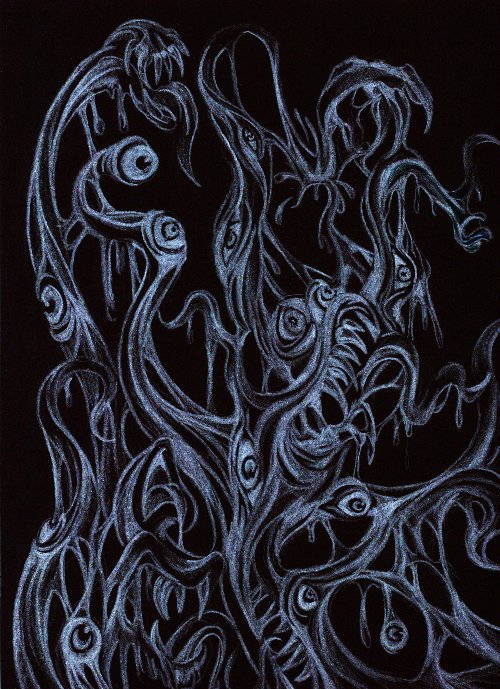
The phrase, above all others, that haunted this weekend's superb conference at Birkbeck , 'Is a Politics of Truth Still Thinkable?', was one of Lacan's most gnomic and provacative formulations: 'truth has the structure of fiction'. Fiction featured centrally in both Badiou and Zizek's different but complementary analyses on Saturday. For Badiou, the challenge was the production of new fictions; for Zizek, the problem was escaping the already-operative fictions of Capital. Badiou's call for new fictions will be discussed in the next post. In this post, I'm going to concentrate on Zizek's analyses of the fictions of capital.
(Incidentally, the weekend yielded sufficient material for ten posts at the very least. I don't propose to undertake the vast task of summarising all six of the papers, but I'm confident that their concerns will seep into posts over the next few weeks.)
One point of Lacan's claim - typically frustrating and intriguing in equal measure - was that truth cannot be apprehended directly, only via anamorphosis. It was made in connection with Hamlet or, more precisely, about the play-within-a-play in Hamlet* (perhaps suggesting that, really, the formula should be that 'truth has the structure of a fiction within a fiction'). Partly what is at stake here - something which Lorenzo Chiesa brought about in his elegant problematization of Lacan's relationship to Marxism on Friday - is the idea that the unconscious cannot lie. Which is at the simplest level is only to reiterate the oldest and most familiar lessons of psychoanalysis: slips of the tongue, dreams, symptoms give us access to a truth which cannot be accessed directly.
In any case, the truth sought over the weekend was not the immediate - and unmediated - totalitarian revelation negatively invoked by Nietzschean-Rortian postmodernism. It is that tradition of thought which has made a 'politics of truth' unthinkable, in both the conceptual and the ethical senses. For such compulsory scepticism, a politics of truth is unthinkable in the same way that nuclear war is unthinkable. We are warned that, without the prophylaxes of ironic distanciation and language game perspectivism, we shall fall victim to a fanaticism which, whether it takes the form of totalitarianism or fundamentalism, is always deadly. (Alberto Toscano's lecture on Saturday was invaluable because it presented a detailed genealogical analysis, passing from Thomas Muntzer's 14th century millenarian preaching through to the Iranian Revolution as observed by Foucault - of how this equivalence - between a politics of truth and fanaticism - had come to be made. +)

To Zizek, then. His target - after a dis-spiriting start wherein he re-cycled his already over-familiar recent riffs on New Orleans and France - was Laclau's attempt to rehabilitate populism. Laclau rejects the 'liberal elite' view that the populist is always proto-fascist, arguing that populism, whilst it is capable of such excesses, is in itself neutral, equally open to utilization by emancipatory currents. Populism, according to Laclau, is to be preferred to 'class struggle' because it does not posit a single, privileged agent or cause. Instead of a monomaniacal focus on the working class, populist uprisings can have at their core anti-racist, anti-colonial, anti-patriarchal (or any other) struggles.
What is wrong with this picture? Well, Zizek said, populism is inherently reformist, if not to say reactionary. Its fundamental fantasy is of an Intruder, or more usually a group of intruders, who have corrupted the system. Hence the problem is never the system, capitalism, but the oligarchy, this particular, lazy, exploitative bunch who happen to have control now. Once They are removed, everything will be alright... Hence populism always frame its project in terms of a series of demands addressed to the ruling elite. Antagonism is defused into a craving for recognition. (To push this analysis further: it's clear that the (entirely complementary) obverse of the demand for recognition is the demand that this or that politician resign, which is why endlessly 'renewed calls' for resignation are constant background noise on the post-political scene.)
This, then, is the reason why class struggle should remain the privileged model. To insist on class struggle occupying a position of centrality is precisely not to invoke the 'working class' as the only agent of emancipation. In a sense, that is already to treat class insurgency as if it were yet another 'multi-cultural' demand for recognition. It's perfectly possible to imagine a capitalism in which, for instance, the demand for recognition of alternative sexualities has been entirely satisfied. But class struggle in the Marxist sense could not be satisfied by anything short of the 'obliteration of bourgeoisie as a symbolic social space' (which is by no means the same thing as the extermination of the members of the bourgeoisie). In a very real sense, the proletariat is that very obliteration. This point is perhaps best made by a joke recently recounted by Lenin on the Tomb. An IRA man in a balaclava is at the gates of heaven when St Peter comes to him and says, 'I'm afraid I can't let you in'. 'Who wants to get in?' the IRA man retorts. 'You've got twenty minutes to get the fuck out.'
For Zizek, Laclau makes the mistake of treating the critique of political economy as a 'positive ontic science' (just as his dismissal of class struggle makes the mistake of treating the proletariat as if it were a positive ontic entity, 'the working class', rather than a 'substance-less subject'). What this ignores is what Zizek, after Derrida, called the 'spectral' dimension of Marx. In Marx's 'hauntology' - where undead labour is the correlate of vitalized commodities - it is understood that fiction structures reality. To call capital a 'self-engendering monster' is not at all to speak metaphorically.
There is a lot to be done with this. Firstly, we can recognize the current political landscape as inherently populist. It is not only, as Zizek said, that populism (whether it be the 'progressive' populism of the anti-capitalist or anti-globalization movements or the reactionary populism of the fuel protesters or the Countryside Alliance) is the complement to administrative post-politics. It is that administrative post-politics is already itself populist. Badiou has argued that post-political malaise is not some accidental side-effect of parliamentary democracy but the terminal phase into which it inevitably declines. The dreary face-off between Blair's authoritarian marketism and Michael 'are you thinking what we're thinking?' Howard's gimcrack xenophobism at the last British election is one indication that capitalist parliamentarianism might in the end only be able to yield the melancholy spectacle of unpopular populisms. (Bush versus Kerry was another example of the same trend, of course.) Populism has little to do with popularity (no matter how far its support dwindles, the UK Independence Party will always be populist, for example) and everything to do with a reified notion of popular will, where 'popular' designates 'what is already accepted' rather than any kind of numerical pre-eminence. Populism projects a restricted sense of possibilities, always offers us a choice from a fixed and pre-existent menu. It is the expression of the always-already, the anti-Event.
This goes some way to explaining the querelous status quo that settles around successful post-political administrators like Blair and Bush. Their continued success is as inevitable as the grumbling discontent which accompanies it like a permanent drizzle. Their success is predicated on a populist appeal to the already accepted, to the Inevitable, which can only ever inspire a disappointed ratification, never commitment or fervour. On the current political scene, 'a politics of truth' is precluded, not by fear of the totalitarian big Brother, but by genuflections to the post-political big Other. Zizek mourned the loss of leaders who can know what we want more than we do ourselves. (Nietzsche was at his most perspicacious in his anticipation of the 'autonomous herding' of contemporary democracy.) Commitment and fidelity cannot survive the expeditious adaptation to focus-group/media-generated 'popular will' which post-political success entails. (In this respect, Blair, who has gone from being unable to utter a sentence unless it was cleared with a focus group to the suicidal fidelity of his Iraq misadventure is something of an enigma and an anomaly.)
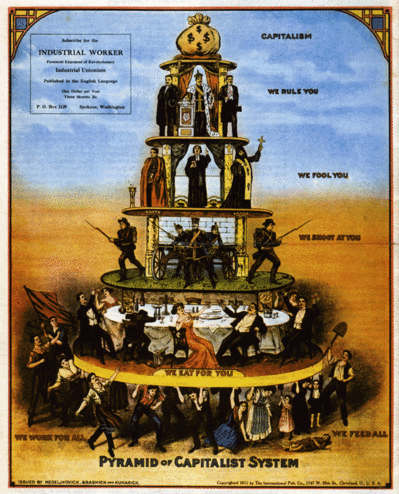
The second big lesson concerns the form of an effective anti-capitalism. Anti-capitalism cannot restrict itself to a set of populist demands any more that it can realistically hope that unicycycling and juggling will spontaneously produce a ludic carnivalesque detournement of the global order. As I pointed out at the time of live8, Everyone - which is to say, All Opinion - agrees with populist calls that capitalism be 'reformed'. But one cannot reform capitalism, because, in a very real sense, capitalism is reform itself: a monster that is not only self-engendering, but also shoggothically protean in its perpetual reconstructions of itself . (Not for nothing is 'reform' the constantly reiterated mantra in the neo-liberal Bible, the Economist). Furthermore, to whom are any 'demands' to be addressed? Anti-capitalism will always be guilty of the 'populist temptation' while it continues to posit a corrupt oligarchy who need only be replaced, or worse, persuaded. The error here is not simply the illusion that 'this particular leadership' are the problem, it is the idea that capitalism has any sort of leadership at all. The administrators' washing of hands which they claim are always tied is not merely an act of self-exculpation; it really is the case that they are the slaves of the remorseless machine of Capital. No-one driving.
One of Zizek's greatest strengths has always been his hyperstitional account of the way in which capitalism runs by generating beliefs and behaviours. Behaviour anticipates belief, in a causal, not a merely predictive, sense. Perhaps that isn't going far enough: it would be better to say that behaviours are already beliefs, Pascalian 'beliefs before beliefs'. Yet ideology, as I've argued before, resides in the (apparent) discrepancy between belief and behaviour. At the level of cognition, people 'know perfectly well' that money is only a token, that commodities aren't alive, yet they behave 'as if' money is a real substantiality and that commodities are a natural force. Such activity is, needless to say, more than sufficient for the purposes of the replication of Capital. But where, here, is the properly fictional level? Does it reside with Capital or with the 'autonomous' individual? Perhaps the relationship between the two is exactly that of a fiction-within-a-fiction: the vast, planetary Science Fiction of Capital generates the implexed fiction of the psycho-biographical individual it feeds upon.
But the real money question is: how are we to dispense with these fictions? If SF Capital installs itself through ritualized behaviours of commodity-compliance, we have to conclude that the only way to rid ourselves of such fictions is to practise new behaviours, new rituals. And that is inseparable from the question of new economic models.
* As Susan Willis explains: 'The prince uses the little drama to create a structure, a dimension of ‘truth disguised’ as a fiction in order to make Claudius betray himself. It is not the narrative (Claudius pouring the poison in the erstwhile king’s ear), but the play scene as a structure that reveals the truth of Hamlet’s Oedipal quandary: in seeing the performed action, Hamlet catches himself allied with his father’s murderer, complicit with him in the desire for his mother. Here, the real is not a kernel, conveniently rock hard and discernable through the veil of fiction; it is instead the very structure, the warp and weft of the veils.'
+ One of the most interesting aspects of Alberto's paper was its discussion of Foucault, which reminded me of some of the issues Tim raised in his latest post on The Wrong Side of Capitalism. Juxtaposing Foucault's Preface to Anti-Oedipus, in which he condemns any attempt to ground politics in a truth, with his enthusiasm for the Iranian Revolution's 'spiritualization of politics' produces quite a vignette.
November 24, 2005
Philosophers have interpreted the world...
I think Jodi Dean is right to lose patience with some of the positions Zizek adopts in his recent 'writings' on the French riots. (The inverted commas are Jodi's, but well-merited for a mode of textual production that is best described as word processor remixology. I wonder how different Zizek's later texts would be if he had to write or type out passages again, rather than being able to cut and paste them.) The failure to articulate a positive vision has long been a major problem with Zizek's work, so it is hard not to find the following extremley frustrating:
'One should bear in mind that the philosopher's task is not to propose solutions, but to reformulate the problem itself, to shift the ideological framework within which we hitherto perceived the problem.'
Weeeell, a few proposed solutions wouldn't go amiss, actually. Partly the problem here is Zizek's positioning of himself as a 'philosopher' rather than, say, a Leninist, or a political theorist. By opposing philosophy to action, he confirms Marx and Engels' famous excoriation of the discipline in The German Ideology. But his dodging of the task - admittedly a forbiddingly difficult task, but the difficulty is part of what makes it so pressing - is symptomatic of a wider malaise on the Left. The Left's presence today remains predominantly a negative one, a consequence, no doubt, of the 'cultural turn' - the retreat from economics into cultural criticism, the Left's pre-eminence in which is a kind of consolation prize for wider geo-political marginalization. Permanent Oppositionalism is the vice of the impotent, a luxury in which the disempowered can indulge. (As is amply demonstrated In Britain by the current status of a formerly hegemonically dominant Right wing party: the irrelevance of the Tories is confirmed by their recline into reactive sniping. Peversely, the effect of such carping is often to reinforce the status quo. As the Independent noted today, it's impossible to believe anything the government says... until the Tories oppose it.)
One benefit of Karatani's Transcritique is that it is prepared to get down and dirty by considering an actual economic alternative to capitalism, namely LETS (the Local Exchange Trading System). Neither Zizek nor Steven Shaviro, in his second post on Transcritique, are persuaded by LETS, for what are no doubt good reasons. Steven can't envisage LETS bringing capitalism down all by itself. But neither is he convinced by what he characterizes as 'Zizek and Badiou’s hyperromantic fantasy of a Leninist Event of radical rupture'. Perhaps the failure of each of these scenarios is their exclusion of the Other: Badiouian Eventalism lacks a reference to economics, while a purely economic model like LETS is in need of a vision of radical (political and ideological) alterity. Wasn't one of Marx's most important innovations his invention of the concept of political economy, after which we can no longer legitimately see politics and economics discretely? (Hence the idiocy of attacking Marxism as if it were a failed economic theory.)
Permanent Oppositionalism certainly contributes to capitalism's self-fulfilling discourse of Inevitability, about which Tim Wrong Side of Capitalism has a few interesting things to say. '[M]aybe we need to introduce an extra detail into this analysis. Unlike Thatcher’s claim that There Is No Alternative (a modernist position of a sort, in that it posited the inevitability of progress, albeit ‘progress’ only on capital’s terms), the Third Way claims precisely to be the alternative (and thus is postmodernist; rather than asserting what the future will be, it simply abolishes the future by claiming to instantiate it).
More newish Zizek material here
And perhaps better than any of Zizek's recent cut and pastisms is this brilliantly observed pre-emptive parody (so effective, as Tim says, that it actually works as a powerful commentary on the French riots).
Irish Wolfhounds of Love
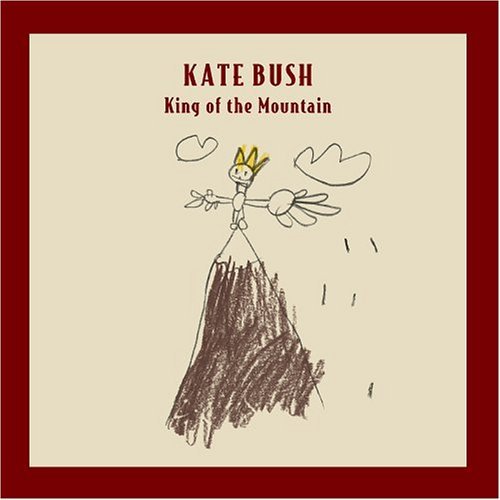
... Or, further thoughts, some of them mine, on Aerial....
Well, the Blog revival continues - Woebot, heronbone, the brilliant It's All in Your Mind* and even the mighty Pillbox+ have all emerged from their cryonic comas recently - with the welcome return of Church of Me, back with an essential post on Kate Bush. Aerial, with its themes of grief and joy, of a return to the world, is, after all, a perfect Church of Me record. It begins with a song that is either about ghosts or heaven (a place where everyone is 'king of the mountain') or both, and it's shadowed throughout, nowhere more intensely and poignantly than on its brightest moments, by an awareness of the omnipresence of death. The affirmation it musters comes not from an extirpation of the morbid so much as an aknowledgement that it is death's winged chariot which drags everything forward; 'death is present in every becoming', as Deleuze and Guattari put it in Anti-Oedipus.
Marcello is right to correct the claim (made by me amongst others) that the first disc is 'a prelude, or a softener, to disc two'. A week's further listening has made me incline to his view that A Sky of Honey 'defines everything at which the songs of disc two laugh, or ridicule, or negate. In other words, the simple and complex joys of A Sky Of Honey would not carry nearly as much emotional impact were we not aware of the tragedies slowly being dissected on disc one.' A Sea of Honey is psychoanalysis, A Sky of Honey, schizoanalysis...
I was driven back to the first disc in part by Tim Finney's remarks on the Dissensus Aerial thread. 'I've found its appeal more ambiguous and awkward but also very insidious. "A Coral Room" in particular is quite astonishing,' Tim wrote of A Sea of Honey. 'Oddly it's almost a reversal of Hounds of Love: here the concept side is the immediately arresting, sparkling, extroverted part, while the "conventional songs" side is quiet, "difficult", containing hidden depths...' That's quite right: the songs here are abstract, demanding, exploratory. Partly that's because, as Marcello observes, the songs have a quality of pensiveness, as if Bush is reflecting on them while she is singing them.
Marcello's post makes me realise that I had stressed the maternal and domestic themes running through A Sea of Honey while downplaying its treatment of grief and loss. In fact, two of the most powerful songs on the first disc - 'Mrs Bartolozzi' and 'A Coral Room' - are about BOTH the maternal-domestic AND grief. In her interview with Mark Radcliffe on Radio 2, Bush was amused that people found 'Mrs Bartolozzi' humorous and even silly, since she considered it one of the heaviest songs she's written. Marcello hears it as the working through of a trauma, focusing on the opening lines, pregnant with Pinterian menace: "I remember it was that Wednesday/Oh when it rained and rained/They traipsed mud all over the house/It took hours and hours to scrub it out." 'The words shiny, clean and white keep reoccurring' so much 'that you wonder: what horror is she trying to erase? Who were "they"? The Gestapo? Come to take her husband and children away? Was Mrs. Bartolozzi...interfered with?' The song's strength lies in its studied ambiguity, its refusal to arbitrate between the banal and the world-historic; the 'they' could equally well be children returning from playing in the garden...
'A Coral Room', meanwhile - Bush's meditation on her own mother's death - is indeed quietly harrowing. Accompanied only by an icy piano, Bush takes us out on a boat as she scatters her mother's ashes onto a lake. In both 'Mrs Bartolozzi' and 'A Coral Room' water - which will become the medium of dream-transformation on A Sky of Honey - is painfully intimate, the elixir of (domestic) life (and site of its memorialization).
* One of Philip's new posts is about Elvis, or rather about the urge to step into his 68 black leather jacket that the likes of Robbie and Morrissey apparently find irresitable. Elvis, of course, is the principal - or should that be ostensible? - subject of 'King of the Mountain'.
+ Penman's return is a poem written on the year anniversary of Jhon Balance's death. Coil come to mind frequently while listening to Aerial: English pastoral, light, elementalism...
In her conversation with Mark Radcliffe, Bush came across as friendly but, if not quite evasive then certainly deflective, unwilling to disclose the song's mysteries. She confirmed that one of the concepts-conceits from which A Sky of Honey grew was the relationship between birdsong and light. A Sky of Honey she said, was a return to the methodology she used to construct song suite on the second side of Hounds of Love, but on a grander scale - a kind of Irish Wolfhounds of Love, she quipped. A Sky of Honey was deliberately composed to be listened to in one sitting in part as a resistance to the fragmentation of the album form brought about by mp3 micro-modularization.
Robert O'Toole has a number of Deleuzian posts on Aerial, including this and this.
November 16, 2005
Look at the light

Its cover image is a waveform of a blackbird's song re-imagined as a geological formation. Kate Bush's Aerial is Deleuzian MOR: a numinous, luminous twitterscape of women-animal becomings, a hymn to light, and lightness.
I'd concur with what's already coalescing into a critical consensus: 'King of the Mountain' apart, the first disc - 'Sea of Honey' - is merely an appetizer for the second CD, the sumptous song suite that is 'A Sky of Honey'.
On the face of it, for this, her return after twelve years, Bush could either make a show of pursuing Relevance a la Bowie, or Madonna, or else recline into a session-musician airbrushed 'timelessness' like Bryan Ferry. In the event, she tacks closer to the second option, but with considerably more success than Ferry has mustered in any of his solo albums for the last twenty years. The sonic pallette from which Bush has constructed Aerial contains few rogue elements, and hardly anything that would have discomfitted a mid-80s audience.
And yet ... 'A Sky of Honey' in particular has the flavour, if not the instrumentation, of later genres. The intermittent birdsong, the lambent washes of subdued strings and synth, the shifts in atmosphere - now tranquil, now tempestuous, now humid, now temperate - recall ambient jungle (I'm put in mind more than once of Goldie's 'Mother'), the lush opiated vastness of microhouse, English pastoral techno such as Ultramarine.
It is in A Thousand Plateaus' 'Of the Refrain' that Deleuze and Guattari write of birdsong. On one side, the refrain is a territorial marker, the tracing of an interiority; on the other, it opens out into the cosmos. Aerial is similarly double: 'A Sea of Honey' exploring the heimlich, 'A Sky of Honey' dreaming the cosmic.

'King of the Mountain' has been one of the singles of the year - insidious and insinuating rather than immediate, a blind-side seduction which makes itself a habit before you've registered awareness of it. Its snowswept eyrie contains the grandest, most elemental, rendition of the twin themes that dominate 'A Sea of Honey' - domesticity and isolation. Kane in Xanadu doubles Elvis in Graceland, wind howling around the melancholy opulence of their empty mansions.
The other songs on 'A Sea of Honey' retreat from these media myth-scapes into more intimate territory. Bush flirts with sentimental indulgence on the song addressed to her son, 'Bertie', while meditating on the line between bliss and banality, pathos and bathos, on 'How to be Invisible' and 'Mrs Bartolozzi', with their imagery of anoraks, wallflowers and washing machines.
What is fascinating about 'Sea of Honey' is its exploration of the Mother's bliss, which has by definition been excised from a history of rock that has endlessly staged the cutting of the apron strings, the rejection of the maternal. There's something oppressive and cloying about this domestic space, something suffocating and greedily insatiable about the protected interiority Bush creates. The 'domestic idyll' is literally agoraphobic, troubled by an Outside it seeks to keep at bay. 'How to be Invisible' is a spell in which ultra-ordinary objects are brandished as protective charms, preservatives of a domesticity that has withdrawn from the wider social world. Yet the heimlich, the homely, is always, also, the unheimlich, the unhomely, the uncanny. In 'Mrs Bartolozzi', a widow's solitude transforms laundry into a Svankmajer erotic dance, the boredom, loneliness and sadness of a confined mind transfiguring empty clothes into an animist memory-theatre. In these circumscribed horizons, washing the floor becomes a religious observance, an act of mourning and melancholy.
If 'A Sea of Honey' is a kitchen-sink delirium, its spaces all carpeted and walled, then 'A Sky of Honey' is widescreen, panoramic, as the words of the stand-out track, 'Nocturn', have it. Everything opens out. It's as if we leave the artificial cocoon of the house to step out into the garden, a garden which becomes a lush Ernst jungle...
What impresses most about 'A Sky of Honey' is the majesty of its composition. It sounds like the sort of thing Bush has done before, but there's nothing else in her oeuvre quite so sustained as this. I mean 'composition' in the painterly at least as much as the musicianly sense, for 'A Sky of Honey' is Bush's most painterly record: each sound a delicate stroke in a delicately constructed and minutely conceived picture. Van Gogh ('the flowers are melting!'), Chagall, Ernst, as much as Joyce or Bronte, seem to be the guiding hands. The painter's medium - light - may well be 'A Sky of Honey's' principal preoccupation. The image of a pavement artist's work destroyed by rain is central to 'A Sky of Honey': 'all the colours are running'. Yet no mood of regret or melancholy can last long here; in an instant, Bush is celebrating 'the wonderful sunset' that the run colours have become. Ironically for a record so artfully and fastidiously designed, so foreign to rock and jazz's spontaneity, the message is that the Accident is the pre-eminent form of creation. We are gently urged to revel in the innocence of becoming, to 'look at the light... and all the time it's a changing....' The record celebrates the butterfly-wing fragility of the Moment, the never-static Hacceities Nature is madly composing and is composed of, the ever-evanescent irridescences of the 'somewhere in-between' in which we are always lost. Between wakefulness and sleep, between land and sea, between sky and dust, between day and night, 'A Sky of Honey' reaches its poised, anti-climax plateau on the last three tracks, 'Somewhere in Between', 'Nocturn' and 'Aerial'. By 'Somewhere in Between', we have reached dusk, the time when everything de-substantializes, and the song is a dance of dying light, a savouring of the evening's bewitched, betwixt state. 'Nocturn' is up there with anything she's done - its oneiric, oceanic disco a kind of becalmed answer to Patti Smith's 'Horses', the white water of Smith's angsts and passions soothed and smoothed into a placid lake in which amphibious longings swim and commingle. 'Nocturn' is a journey to the end of the night very different to the one Celine took: a Van Gogh-visionary stretching, a reaching both up into the sky and down into the sea.
'The stars are caught in our hair/ The stars are on our fingers/ A veil of diamond dust/ Just reach up and touch it/ The sky’s above our heads/The sea’s around our legs/ In milky, silky water/We swim further and further/ We dive down... We dive down...'
There are suggestions of Joyce's Anna Livia Plurabelle here, the river heading out to the sea that will swallow it, just as the dreaming mind awakens. After this, there is the dappled return of sunlight on 'Aerial', glimmers of light on the water's surface, 'all of the birds laughing', Bush joining in.
Magisterial, and better with every listen.
November 15, 2005
The inevitable and the impossible

'It's inevitable.... like globalization....' Striking that the hapless Mark Corrigan should choose 'globalization' as an exemplar of the 'inevitable' at the moment he euphorically overcame impotence in the first episode of the latest series of Channel 4's brilliant anti-Lad comedy, Peep Show. A symptom, no doubt, of the degree to which global capital and the notion of inevitability have become synonymous in the popular unconscious.
Capitalism's appeal to inevitability is now so commonplace that it is a legitimate question as to whether the idea of inevitability is integral to the spread of global capital. 'Inevitability' operates as a kind of negativized hyperstitional motor for capital. If hypersition is about 'fictions making themselves real', then Capitalist Inevitability is about current reality maintaining itself in perpetuity. More of the same, forever. This alleged Inevitability is not a question of 'Economic Laws' - the hideous coupling of Hegel and Adam Smith in the neo-liberal climax of history - but of belief. The Inevitable figures as a belief that engenders behaviour in a self-fulfilling circuit. It is because people believe that capitalism is Inevitable that it is. For now.
It appears that former Green and Friends of the Earth activist 'Sir' Jonathan Porritt is now a reluctant advocate of the view that Capitalism is inevitable. As summarised by The Guardian, Porritt's current position 'is pragmatic and goes briefly like this: it is impossible to deny the need for profound change in the face of today's ecological crises; the pace of change is not sufficient, and conventional environmentalism has failed to win over hearts and minds; change has to be desirable and will not come by threatening people with ecological doom; therefore, we must embrace capitalism as the only overarching system capable of both reconciling ecological sustainability, and reforming it. More to the point, he says, "we don't have time to wait for any big-picture ideological successor"'. ''Like it or not,' Porritt writes, 'capitalism is the only game in town. The drive to extend the reach of markets into every aspect of the economy is an irresistible force.' What's odd about Porritt's argument is his (albeit mitigated) faith in capitalism, his conviction that it is in any way 'realistic' that capitalism will deliver ecological sustainability. What is particularly disappointing about his position is that it incorporates Green issues into Capitalist Realism rather than positing them as an aspect of the Real which Capital cannot metabolize.
Whilst intended to convey swaggering teleological certitude, the appeal to Inevitability also bespeaks a certain libidinal deficit in capital, for the silent clause in any claim about capitalism's Inevitability is 'you might not like it, but....'. In practice, of course, the Inevitable cashes out as the extirpation of politics and its replacement by administration, generalized managerialism and Reform. (This crock of shit is extremely difficult to sell convincingly, as Blair is now discovering.) The precise opposite of the Inevitable is the Impossible, which is why any genuine notion of the political must be based upon the Impossible, on what is unthinkable in the current arrangment of reality.
Perhaps the lineaments of this Impossible alternative are visible in what is happening in France, which is in part the obverse of the dominant Gleamprog narrative of globalization. Only those left behind by the 'inexorable tide' of the Inevitable will make the Impossible happen.
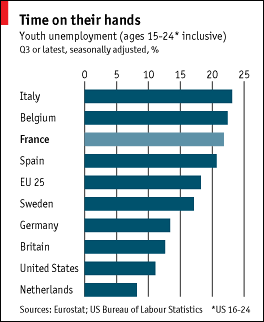
Interesting, and telling, that disenfranchised Muslims are held to be the Enemy by both the neo-liberal advocates of deterritorialized capital and their supposed adversaries in protectionist Old Europe. 'Islamofascism' easily trips off the tongues of neo-libs (essentially because the predicate 'fascist' is already contained within the subject 'Islam' as far as they are concerned), while IslamoMarxism is treated as a joke.
But - credit where credit's due - in a welcome break from his standard idiocy, Aaronovitch today rejected the idea that the riots could be attributed to the religious background of those involved. (He also rightly exoriates the racist denunciations of 'Eurabia'.) In this he is supported by none other than the Economist, which argued on Friday that the riots were an 'underclass rebellion' sparked by factors which were primarily economic, of which unemployment is the most significant (see its graph, above). 'This was the angry rebellion of a beardless, Nike-wearing teenage underclass.' (The Economist's analysis is not as far away from that of Badiou's l'Organisation politique as you might expect.) However, the economic, the ethnic and the religious are not easily separated, in part because being unemployed and being a muslim are much more closely correlated, in France as in Britain, than they ought to be. As the Economist points out, 'according to a report last year by the Institut Montaigne, a think-tank, the unemployment rate of “visible minorities” [in France] is nearly three times the national average.' But this means that a flip is always possible - and that many around the world who now identify themselves in terms of a religious affiliation could come to see themselves as part of a worldwide underclass ... the 'detritus of globalization' as the seeds of a new revolutionary subjectivity?
November 13, 2005
Odds and ends
Adam Kotsko replies to my posts on unemployment from last week....
__________________________________________________________________
Two, closely related, posts by Steven Shaviro... the first on use-value, the second on Kojin Karatani’s Transcritique, which aims to bring together Marx with Kant. (I'm very sympathetic, incidentally, to Steven's call, contra Zizek, for a reading of Lacan through Kant rather than Hegel. Zizek's review of Transcritique, incidentally, can be found here, on Jodi Dean's site).
In the post on use-value, Steven rejects what has calcified into an orthodoxy in certain areas of French theory : the view that Marx nostalgically resisted the vertiginous implications of exchange value (the ultimate example of the delirial play of signs without a referent) by retreating into the notion of a pre-commodified and unmediated utility. (I must confess that I have in the past been guilty of uncritically endorsing and propagating this attack on Marx.) Steven points out that usefulness is something quite different from use value, and that the latter only comes into effect precisely by reference to exchange value. Far from being originary, use-value is only ever retrospectively posited from the point of view of exchange value, so 'it’s not Marx, but the neoliberal, free-market economists, who make the mistake of hypostatizing use-value, of endowing it with fundamental meaning, of attributing to it a transparent, “direct relation of utility for a subject.”'
The Karatani book, which I look forward to reading, apparently makes a similar move. Importantly, Karatani says that is not Marx but Ricardo that is the advocate of the labour theory of value. According to Karatani, Marx treated the relationship between the labour theory of value and its opposite - Bailey's idea that value was purely relational - as a Kantian antinomy. In his piece on Transcritique describes antimonies in terms of the parallax, 'the reality exposed through difference'. Like many of Kant's concepts, the antimony is mind-meltingly destabilizing: at one at the same time, it is a both-and relation (value is generated both out of labour and purely relationally) and a neither-nor relation (neither labour nor pure relationality are sufficient to account for the genesis of value). The truth of the antimony lies in its irresolvable tension, not in any solution to it (not that any solution is possible in any case).
---------------------------------------------------------------------------------------------
UPDATE: Bat mails in defence of Baudrillard. Bat pointed out that the rejection of the idea that use-value was primordial had been made by Baudrillard in For a Critique of the Political Economy of the Sign. I replied that this is indeed so, but Steven's point was that Baudrillard thinks he's deconstructing Marx when in fact this is what Marx himself says. To which Bat answered as follows:
'Hmm, I wonder about this. People are always a trifle too quick to
pronounce on what they think Baudrillard thinks he's doing.
What strikes me about For A Critique... is that Baudrillard's reading
of Marx is blatantly (ie too blatantly) "unfair" – he selectively
quotes the sections of Capital that back his reading, eg over
anthropocentrism, Crusoe.
My take on this is that JB is gunning at Marxism, or rather the
Stalinised academic Marxism that dominated French intellectual culture
at the time. But he deliberately avoids the standard "no no, /this/ is
what Marx was /really/ saying" strategy – which would represent yet
another "return to Marx", yet another futile attempt at shoring up
Authenticity, and consequently be inconsistent with JB's peculiarly
Evil version of logic of the signifier.
Instead he reverses things by saying, "yes, yes, Marx /is/ the use
value fetishist you secretly take him to be – and much more so..."'
__________________________________________________________________
If you haven't seen this clip - a trailer for The Shining recut to completely change the meaning of the film - brighten up your day and take a look. This should become a standard in Media Studies class as an instant tutorial in how meaning is generated through editing and anchorage... The trailer isn't wholly misleading, however. It reveals a certain truth about The Shining, which, as Walter Metz argued, is not a straightforward Horror film, but a meta-generic exploration of the relationship between Horror and the family melodrama. The clip also reminded me of Jameson's observations in 'Culture and Finance Capital' that the film trailer is the art form most symptomatic of our phase of capitalism. In trailers, Jameson claims, the images are 'fully satisfying in themselves, without the benefit of the laborious threads and connections of the ... plot. At this point it would seem that the preview, as a structure and a work in its own right, bears something of the same relationship to its supposed final product as those novelized films, written after the fact of the movie and published later as a kind of xeroxed reminder, is to the filmic original it replicates. The difference is that, in the case of the feature film and its book version, we have to do with completed narrative structures of a similar type, structures both equally antiquated by these new developments'.
November 08, 2005
Underemployment
Typically thoughtful post from Eoghan at Scrabbling at the Lock in response to my remarks on unemployment. 'Work was something you were doomed to, a return to the miseries of school life with its uniforms, meaningless activity and arbitrary rules, and I did my best to delay its onset, to sabotage my suitability for employment,' he observes, concluding, ' If unemployment is no longer a viable option, then let me at least be underemployed.'
Nothing defines the Right so thoroughly as their detestation of welfare. The spurious economic rationale for this denigration does little to conceal its real libidinal basis: namely, the sense that They - the scroungers, the 'bogus asylum seekers', the immigrants - have stolen 'our' enjoyment. Work is deemed to have an absolute value: routinized exertion of whatever kind, no matter how useless, demeaning or even malevolent, must be thought of intrinsically good (this superstition, sadly, is widespread in the working class, as it would have to be). In this respect, it is interesting to reflect that part of the back story of Blunkett's second 'resignation' is the Labour Party's plans to 'reform' incapacity benefit, memorably described by the Independent last week as akin to the ravings of a demented Emperor. Blair wants to cut benefit by twenty pounds a week and, ludicrously, 'name and shame' doctors who write sick notes.
Weber famously speculated on the links between the Protestant work ethic and the spirit of capitalism. Whatever the causal linkage, capitalism clearly cannot operate without an 'ethic' of quantitative increase that is literally pointless.
Traditionally, the Left has been insufficiently critical of this fetishization of labour. It is the likes of Andre Gorz (Critique of Economic Reason, Pathways to Paradise: On the Liberation from Work) and the Situatonists ('Never work') who have made underemployment a goal.
November 06, 2005
Pending resolution
'Perhaps Old Europe ended with us, we thought. Perhaps Old Europe was the secondhand paperbacks we exchanged. It was the compilations we made on cassette for one another. It was Gang of Four and The Raincoats. It was The Fire Engines and Magazine. It was Kafka and Canetti. It was that great tide of records and books on which we were borne.'
- Spurious
'"Work is always available if you look hard enough." How hard? Hard enough to get a job -- therefore, if one does not have a job, one has not yet looked hard enough, by definition. The failure to work hard is, on the official ideological level, the most serious moral failure in American society.'
- Adam Kotsko
It's something I can easily forget now, but I've spent most of my adult life unemployed or as a student (the difference between the two, in terms of lifestyle, money, social status, or rather lack of it, were, at that time, indiscernible of course). Spurious' recent post on unemployment, almost an elegiac Borgesian parable, treats the condition as an opportunity, a space outside, rather than a lack of, Work. 'Unemployment - the un was privative, but we experienced it as liberation.' For Spurious, State-funded unemployment made possible a leisured contemplation now circumscribed by the ubiquitious, insidious spread of 'Regeneration'. (One could say the same for State-funded education, since today's university student typically has little in common with the old-style unemployed; the indebted student is now also and already a worker.) But, as I read Spurious' account, I was reminded of Adam Kotsko's rather bleaker post from a few months back, and it his account which chimes with my own experience.
For reasons that were existential and psychological rather than economic, unemployment never felt like something I had chosen. Rather, I was convinced that Unemployability was a Fate, that life was not a deliberate avoidance of work so much as a fleeing from the implications of that social uselessness. When I graduated in the late eighties, graduate unemployment was just starting to bite, but my conviction was that this only confirmed the inevitable. The economic situation might have exacerbated the problem; in the end, however, it didn't much matter since I would never work any way.
Lack of work amplified a feeling that I imagine many people have, but which was particularly pronounced in my own case: a sense that I was not quite real. There was no point getting a job interview, because, along with my 'incompetence', my fundamental fraudulence would be immediately evident to the panel. A magic circle was in place, a familiar closed loop: I would never work because of my inauthenticity; my inauthenticity would only be cured by working. I went to job interviews hoping that the interviewers would persuade ME that I could do the job, which isn't quite the right way round.
The great benefit of eventually getting a long-term job is that it demystified and desublimated Work. Once inside the magic circle, the discrepancy between the language of job ads (which make it seem like only the most hyper-competent, self-motivated careerist automaton could hold down the most modest of positions) and the reality (of poor organization, routine incompetence) became apparent.
When Tim Wrong Side of Capitalism linked to Spurious' post, he rightly made the connection with Deleuze's Postscript on Societies of Control. Which makes me think that Kafka (who, with Foucault and Burroughs is a central figure in Deleuze's essay) is not an avatar of Old Europe, as Spurious suggests, but of New Europe. Or to be more precise: Kafka stands on the cusp between the Old Europe of Fordist discipline and the New Europe of Control. Deleuze reminds us of the infamous distinction, in The Trial, between ostensible acquittal and indefinite postponement, correlating the former with the disciplinary societies we are in the process of moving away from and the latter with the control societies we are moving towards. 'In the disciplinary societies one was always starting again (from school to the barracks, from the barracks to the factory),' Deleuze wrote, 'while in the societies of control one is never finished with anything.'
'Continuous assessment' is the mode by which Control operates. K's anxieties in The Castle and The Trial arise because his status is always pending resolution. He is never really anything finally or definitively. Awaiting the judgement of the court is structurally identical to waiting for the position as Land Surveyor to be ratified; in both cases, K is a homo sacer waiting to be re-admitted into the ranks of the human. But if disciplinary societies held out the hope of finally Being Something (of having a lifelong job), Control societies make any position provisional, temporary, subject to review. Precarity is permanent.
